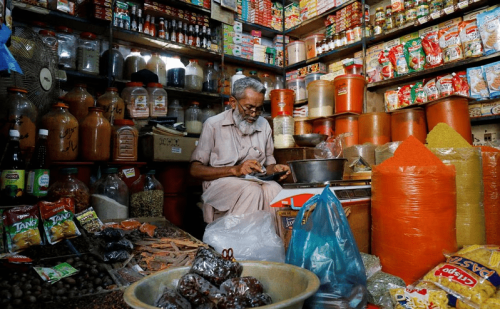KARACHI: Prices of essential commodities are showing a mixed trend a week before Ramazan unlike the same period of last year when most items had shot up beyond the reach of the common man.
Flour has seen one of the most notable declines thanks to huge wheat imports by the private sector.
A survey of prices based on the Sensitive Price Index (SPI) this week revealed a substantial drop in a 20kg wheat flour bag to Rs1,635-2,100 from Rs2,500-2,960, followed by a fall in fine flour rate to Rs109 per kg from Rs156 as a result of drop in wheat prices.
A 10kg wheat bag is now available for Rs792, while it cost Rs1,240 in the lead-up to Ramazan last year. However, consumers have not seen any price relief in prices of Roti and bakery items thanks to the authorities’ indifference.
The price of sugar rate has gone up to Rs150-165 per kg from Rs138-163. But the government has now persuaded millers to sell the sweetener at Rs130 per kg.
Consumers yet to see relief in roti rates despite big decline in wholesale wheat flour price
The country exported 757,597 tonnes ($407m) of the commodity during the first seven months of FY25 while 33,101 tonnes were exported ($21m) during the same period of last fiscal.
The price of gram pulse, one of the most sought after items of the holy month, has surged to Rs280-420 per kg from Rs235-300 per kg. The demand for gram pulse rises during Ramazan because it is used for preparing Baisan, the key ingredient for Pakoras.
Mash pulse has given a slight relief to the consumer as it has fallen to Rs400-560 from Rs470-600 per kg. Mash is used for making Dahi Bara.
The price of high-quality Moong has risen to Rs460 from Rs390 per kg while the average variety is available at Rs280 per kg. Moong is used in making Pakoras and Dahi Baras as well.
Vegetable consumers are happy as tomato rates have seen an unbelievable fall to Rs100 for five kilograms, albeit of the slightly green variety) while some pushcart retailers are offering three kilos and four kgs of superior variety for Rs100.
The SPI data revealed the average national price of the red fruit at Rs 25-100 per kg in the country. It was Rs180 per kg last year.
Onion rates have crashed to Rs60-130 per kg from Rs180-340 per kg last year thanks to arrival of the Sindh crop, which is feeding regions upcountry as well.
Onion consumption almost doubles during Ramazan as it is an essential ingredient for Pakoras. Nimko makers also make Pakoras in bulk quantities during the holy month.
Potato, another item in demand, has not seen any significant change in its prices. It is being sold at Rs50-100 per kg.
Meat merchants have already shown their true colours by raising prices by Rs50-100 per kg. Good quality meat, with bones, is being sold at Rs1,250-1,270, as compared to Rs1,200 last week, while boneless meat is available at Rs1,500-1,600, up by Rs70-100 per kg. Some greedy retailers are demanding Rs1,700 per kg.
A retailer attributed the price hike in veal meat to rising wholesale rates. Veal becomes a hot commodity ahead of Eid ul Fitr for making kebabs.
As per SPI data, the price of average quality beef, with bones, has risen to Rs750-1,300 per kg from Rs600-1,100 last year.
Despite no unusual demand in Ramazan for mutton, its prices have climbed to Rs1,550-2,400 from Rs1,400-2,200 per kg.
The demand for rice soared 25-30 per cent this week due to high demand for in Iftar-dinner receptions.
The prices of broken Basmati rice have gone up to Rs160 from Rs130, showing a minor drop in the low quality variety.
Likewise, rice 6/9 variety is available at Rs110-200 per kg as against Rs140-200.
Over the last one year, the price of good quality cooking oil (five litre packs) has been steady at Rs2,895-2,995 as compared to Rs2,500-2,750. A one kilo pouch of good quality ghee is being sold at Rs 560-595, as against 470-510 last year.
Consumer price index
Shankar Talreja of Topline Securities expects the Consumer Price Index (CPI) for February may clock in at 2.0-2.5pc year-on-year (flattish month-on-month), taking 8MFY25 average to 6.07pc compared to 27.96pc in 8MFY24.
During February 2025, food inflation is expected to decline by 0.4pc MoM mainly on the back of a 55pc decrease in prices of tomatoes, 27pc decline in onion prices and 21pc decline in potatoes prices.
Published in Dawn, February 23rd, 2025












































